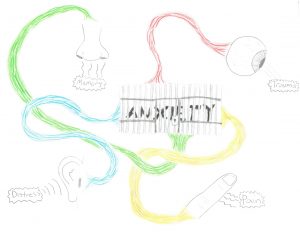A stressful world
Every day the average person goes through a plethora of stressful events. We go to work, school, or take part in other tasks that demand a lot from our brains. We never have the chance to “get away” from our stressors with the invention of email and smartphones. They continuously remind us of things we have to get done and interrupts our downtime. It seems like many of us, especially college students, have never ending lists of things to do before we get any time to relax. Stress has become such integral component of our daily lives that we are beginning to see more and more cases of anxiety disorders. Research has shown that physical changes occur in our brains as they respond to stress suggesting semi-permanent effects. Our DNA is modified is response to prolonged anxiety causing changes in neural connections. These changes can cause problems with memory and can even lead to heightened anxiety. The topic of stress and anxiety is an important one as it is a common feeling felt in most people and is a prevalent issue in mental health.

What’s going on in our heads?
Anxiety is the brain is a difficult mechanism to piece to together even for top anxiety scientists. Nevertheless, there are some concrete pathways that we for sure know are involved in stress and anxiety. The stress response begins in the brain. The hypothalamus or pituitary gland release hormones into the blood to induce a change in body physiology. Ultimately, these hormones change how we feel and are an integral component of our fight or flight response. However, an imbalance in these signaling hormones can lead to anxiety disorders.
The hippocampus is a structure in the brain utilized in memory consolidation. This structure includes a lot of cells containing receptors for the hormones described previously. It is believed that these hormones are essential for proper memory formation and that too much or too little of them will cause problems with anxiety. In cases of PTSD, it is believed that there are too many of these hormones in the hippocampus leading to a strong association to be made. This results in the formation of a memory that could trigger feelings of anxiety or stress in unnecessary circumstances. The excess hormone in the hippocampus pairs with action of a neurotransmitter called glutamate. Together, these two molecules cause a cascade of signaling to occur resulting in modification of our DNA. This change in DNA causes new genes to be turned on that improve our ability to learn. In many cases this is a good thing, but in cases of PTSD, this means that traumatic events are remembered very vividly and can cause excessive feelings of anxiety. Today, scientists are working to find out how to alleviate the memories of traumatic events while preserving normal functioning in learning and memory.
So what’s the deal? Is anxiety good or bad?
Generally, anxiety is a good mechanism to help keep us safe. If a specific situation causes anxiety, we are generally going to avoid contact with that situation. Perhaps you get anxiety being around snakes so you never touch them or get near them. From an evolutionary prospective, this is very beneficial. Snakes can be dangerous and avoiding them through prevention of an anxious feeling would be beneficial overall. The problem arises when anxiety occurs in situations where it shouldn’t. Social interactions with people you know to be good should not cause a severely heightened sense of anxiety. There is no danger to be anxious about in this situation so there is no reason for us to try to avoid it. Yet many people do get this feeling at seemingly random times. Some people don’t even have to be in a stressful situation to feel stress, they just have to be reminded of one. Perhaps an image vaguely relating to a traumatic event brings on these feelings of anxiety. This is the case for many people with PTSD who experience trauma and are unable to weaken the association of their anxiety to the memory of the event. In these cases, anxiety is a very negative response and holds no survival value. We should remember to avoid dangerous things but these memories should not lurk into safe situations. Further research is necessary to help treat individuals with anxiety disorders because they can have profoundly negative impacts on the person’s quality of life.